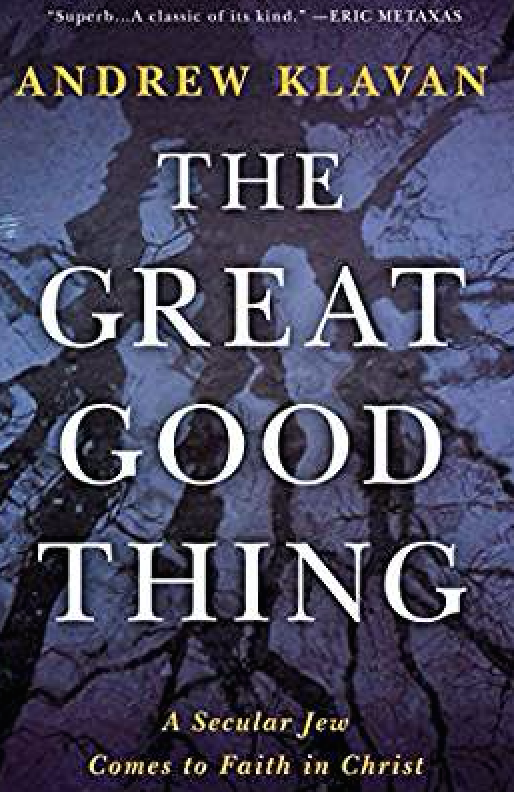I really wanted to love Andrew Klavan’s new book The Great Good Thing. And for the first 230 pages, I did. In fact, I couldn’t put it down after being grabbed by the subtitle “A Secular Jew Comes to Faith in Christ.”
To say he’s an amazing writer is an understatement. He recounted episodes of his Jewish upbringing in ways that made my heart race. I’m sure some of that was because of the similarities to my own life – growing up on Long Island with Jewish parents in post-holocaust America and more. But even a Gentile from Iowa would find his prose fluid, engaging, and, at times, exciting.
Halfway through the book, I calculated how many copies I wanted to order to start sending out to Jewish relatives and friends. Could this be the best pre-evangelistic tool for reaching my people since Stan Telchin’s Betrayed?
Different kinds of book reviews answer different kinds of questions. To some of these questions, I offer the following answers about Klavan’s book:
Is this a good book? Yes.
Is it worth reading? For some people, perhaps.
Who would benefit most from reading it? Gentile Christians who want to understand better how their Jewish friends think about Christianity, why they might be strongly resistant to it, and what emotional dynamics are involved in conversion.
Is this a good book to give to unsaved Jewish people so they can understand the gospel better and move closer to faith in Jesus? Sadly, no.
In other words, I was disappointed.
To be sure, he explains the story line of the Bible – both Old and New Testaments – in ways that would make sense to unsaved Jewish people and might even persuade them the two parts fit together well. And his wrestling about Christian anti-Semitism shows the horror without defeating the possibility of conversion.
But it’s his vagueness in describing the substance of his faith and his minimizing of his conviction of sin that harms the book. Even more, it’s his complete omission of his understanding of what the cross accomplished, and his grasping of why Jesus had to die that make the book unhelpful (at best) and misleading (at worst).
I tried to read his climactic chapter, “My Conversion,” through the eyes of my relatives. It follows chapters recounting his serious emotional struggles (depression, suicidal thoughts, confusion, obsessive behaviors, etc.), and how psychotherapy delivered him. He really was a mess. His description of his “five epiphanies” with the help of a great counselor shows just how marvelous therapy can be.
But then his so-called “conversion” came without a cross or repentance or conviction of sin or anything we would call “essential” to saving faith. He certainly experienced a lot of joy. He came to believe the resurrection really happened. He saw how Biblical faith is superior to atheism, relativism, Zen Buddhism, Unitarianism, and other competing worldviews. And, in a long car ride, he heard God tell him to get baptized.
I could imagine my relatives reading all this and saying, “I’m so glad he got help before he killed himself. Isn’t psychology wonderful!” They might even say, “I’m happy for him. He found a nice peaceful place to connect to God at that church in California.”
But I’m quite certain they would not feel any sense of “oughtness,” that they must believe in Jesus, that they’re lost without his atoning sacrifice, that they must repent and be saved, that He’s the only atonement for sin and that all their other efforts toward righteousness are like filthy rags.
In fact, the book’s evangelistic potential dropped significantly because of some of his statements in the final chapter. He decided to not tell his dying father about his conversion because he didn’t want to “break his heart.” After he died, his father communicated with the author by “calling home again now, this time from that unseen city from which no traveler returns” (p. 260).
Jewish people already have a strong default setting on presumed eternal life without Jesus, repentance, or renouncing efforts to justify themselves before a holy God. Klavan’s last two chapters would do nothing to disabuse them of that confidence.
At times I wondered if he just needed more time to mature in his faith before writing his story. But then I remembered his first chapter, where he said he wrote this book a full ten years after his baptism. It made me wish he would have had a more evangelistically minded editor. The net effect, I’m sad to say, is this seems like a missed opportunity.



